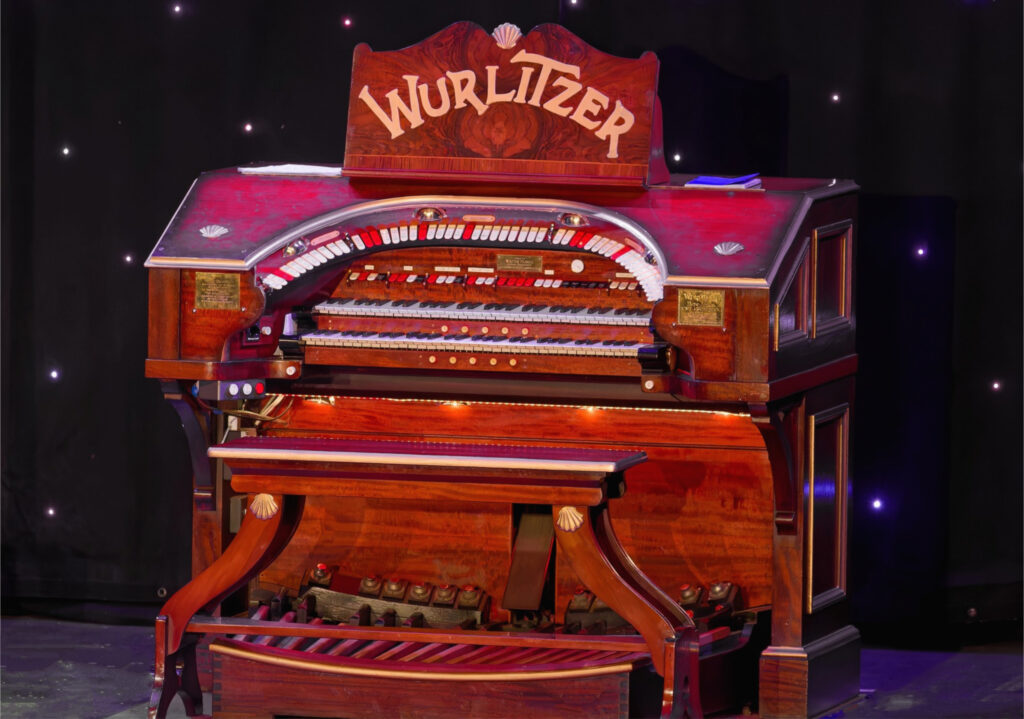Rye College
Love Lane
Rye
East Sussex
TN31 7NQ
Wurlitzer (Opus 999) – Style: D
Originally from the Palace Theatre, Tottenham. 1925
2 Manuals
8 Pipe Ranks plus Digital Clarinet and Kinura
 The ‘Rye Wurlitzer’, Opus Number 999, was the second Wurlitzer to play in the UK, opening on 6th April 1925 at The Palace Cinema in Tottenham, North London, which at the time was under the ownership of Provincial Cinematograph Theatres (PCT).
The ‘Rye Wurlitzer’, Opus Number 999, was the second Wurlitzer to play in the UK, opening on 6th April 1925 at The Palace Cinema in Tottenham, North London, which at the time was under the ownership of Provincial Cinematograph Theatres (PCT).
The two manual, six rank organ (2/6) was installed in a single chamber high up on the right side of the stage, in what had formerly been a theatre box. Once installed at Tottenham, the Wurlitzer was opened by Jack Courtnay on the 6th April 1925 with a showing of the silent films, Find Your Man’ and ‘Never Say Die’ and a full variety bill. Once the ‘talkies’ took over, the organ went on to be used for solo spots, providing music during the interval, and accompanying sing-alongs. Subsequent resident organists at the Palace Cinema included Frank Matthew, John Bennett and Alan Cornell.
During the 1950’s, with the advent of television, and a change to the format of cinema presentation, the Wurlitzer was used less and less, until it was finally put up for sale in the middle of 1957. The organ was purchased by Rye Grammar School for the sum of £450. It was removed from the Palace Cinema during August 1957, transported to Rye by Bournes Removals, and installed on a balcony at the back of the newly built school hall. There wasn’t enough room in the chamber to install any of the percussion items (except the Cathedral Chimes) and so they were put into storage but sadly over the years became damaged and lost.
During the late 1950’s and 1960’s the Wurlitzer was in receipt of regular maintenance and was often heard playing in the school but during the 1970’s this ceased due to a lack of funding, and its condition rapidly declined. In 1980, a new chemistry teacher, Nigel Spooner, started at the school, and he was also a fine organist. He breathed some life back into the Wurlitzer and once again it was heard playing in the school, including being featured in quite a few concerts organised by the Theatre Organ Club of Great Britain (TOC) with renowned players including Bobby Pagan and Trevor Bolshaw, and a relative newcomer, the 1980 UK Young Theatre Organist of the Year, Michael Wooldridge, who played in a number of the concerts. Mr. Spooner moved on around a decade later and the Wurlitzer was threatened with being sold on.
The Rye Old Scholars’ Association (ROSA) came to the rescue and organised some fund-raising concerts to keep the organ at the school but these began to make a loss, so eventually they declared enough was enough. Having grown attached to the instrument, the Chairman of ROSA, who was a former Head Boy and now a music shop proprietor, Richard Moore, decided to go it alone.
Richard founded the Friends of Rye Wurlitzer society (FORW) and much money was raised to go into the restoration project. With the help of lottery funding, by 2003, the Wurlitzer had been returned to its former glory of 1925, including the replacement of the missing percussions.
In 2007, the organ’s console was moved from the balcony, where nobody could see it properly, to be sited on the stage, now on its own lift. The following year, the console was completely refurbished. The installation of a modern relay system has allowed the addition of some extra pipework, a Clarinet and a Kinura, so the organ now has 8 pipe ranks, bringing it to just under 600 pipes, varying in length from 16′ long for the deepest sounds, to just a few inches, the size of a pencil, for the highest sounds, all of which are tuned by hand for each concert. The organ now also benefits from a couple of digital (electronic) ranks, an Oboe and a String Celeste, so the Rye Wurlitzer can now be classed as a 2/10 hybrid.
The Wurlitzer has also become the cornerstone of the world renowned Rye Wurlitzer Academy. Founded in 2009 by Richard Moore, Michael Wooldridge was recruited in early 2010 to be Principal Tutor and, since then, over 150 students have tried their hands playing the Wurlitzer, with some going on to win the UK Young Theatre Organist of the Year Competition or to play in concert, and thousands of young people have seen, heard and enjoyed the Wurlitzer, so its future in the school is secure.
